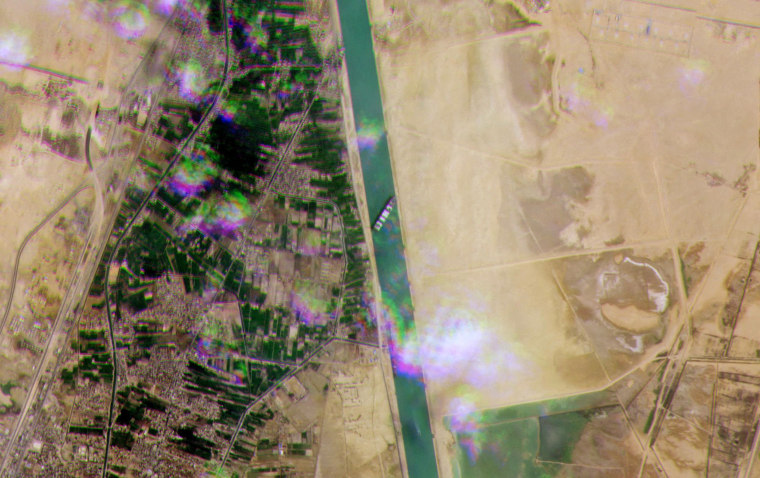The running aground of one of the world's largest container ships, blocking all traffic in the vital water passageway of the Suez Canal, could mean shipping delays for consumers around the globe and higher gas prices, maritime experts say.
The extent depends on how quickly the massive vessel, the Ever Given, which holds upward of 20,000 shipping containers and is as long as the Eiffel Tower is tall, can be moved out of the way.
Everything from food, furniture, clothes, shoes, exercise equipment, electronics, car parts and carpets could be affected, logistics experts say.
“Basically anything you see in the stores,” said Lars Jensen, an independent container shipping expert based in Denmark.

About 12 percent of total global trade moves through the Suez Canal, which connects the Mediterranean Sea with the Red Sea. Crude oil, refined oil and liquefied natural gas shipments passing through account for 5 to 10 percent of global shipments, David Fyfe, chief economist at Argus Media, a market research firm, said in an email.
Already, hundreds of ships are stuck in a holding pattern, according to shipping trackers. Clearing up the logjam within a day or so may mean only a few extra days for the delivery of goods from Asia to the United States. But if the Ever Given remains stuck for a week or more, it could add at least 10 days of extra time as ships are rerouted to longer journeys, Fyfe said.
Prices at the pump, already on the rise, could spike further, as the canal is a major artery for oil transport.
Global shipping giant Maersk has seven container vessels affected and is keeping an eye on the impasse.
“Maersk is constantly monitoring the current situation in the Suez Canal and closely following the refloating efforts of the impacted vessel,” spokeswoman Concepción Boo Arias said in an email.
Washington is also watching.
"We have a literal bottleneck in the Suez Canal today," Federal Reserve Chair Jerome Powell said during a Senate banking hearing Wednesday morning.
The blocked ship is another straw on the back of a global shipping system already broken by pandemic disruptions, Jensen said.
“This takes capacity out of a system that is already starving for capacity,” he said.
Freight shipping rates have been at historic highs for months as the coronavirus pandemic has strained the global logistics network.
Consumers stuck at home, many with more disposable income — partially due to the decline in available services, entertainment and restaurants to spend it on — are racking up home delivery purchases.
While some experts say she could be refloated today, many believe tomorrow is more likely.
At the same time, Covid-19 restrictions at ports and a decrease in the number of healthy and available longshoremen and other logistics workers are also pinching throughput.
In addition, there is a shortage of physical containers to carry the goods. Trade imbalances have meant that for every three cargo containers of goods coming from Asia to the U.S., only one is going back, adding to shipping delays.
The backlog "will impact commodities that are in short supply and don't have safety stock," Glenn Koepke, senior vice president of customer success at FourKites, a logistics software company, said in an email. "Typically, buyers plan at least 2-5 days of safety buffer with inbound ocean freight due to delays that can occur at origin or through customs clearance process."
“If they are able to clear the channel or pull the vessel to the side to allow traffic to flow through, then there should be minimal impact to consumers. If the vessel remains stuck for a week or more, this could have massive implications," Koepke said.
The majority of cargo shipped to the U.S. goes to the West Coast from Asia, but if the traffic from the Suez to the East Coast is rerouted to the West then it will further congest ports already experiencing backlogs.
“All these are ripple effects of the pandemic,” Jensen said. “There are a number of dominoes.”
The Ever Given currently has no speed, according to live data tracked by Vessel Finder. But it has been nudged closer to one of the canal banks and may soon be tugged into a position where traffic may be able to resume, Fyfe said.
Authorities hope to have it tugged out of the way within 24 hours so traffic can resume, Keith Gaskin, owner of SEKO Logistics, a U.K.-based supply chain management services company, said in an email.
“Very little information is coming out, but prospects are that she could be refloated today. Meanwhile, we believe that this may be too optimistic. Tomorrow is more likely but, of course, it is really difficult to say,” said Jacob Guldager, branch manager and business development director for Leth agencies, a Norway-based shipping agent for the Suez Canal zone.
Eventually, shoppers could pay the price.
“There are millions of dollars of commodities in the other ships, and if it is not cleared quickly then they will look to take other routes, meaning longer time, more fuel and more costs that could eventually be seen passed down to consumers,” said Ian Woods, a marine cargo lawyer and partner at the London-based firm Clyde & Co.
